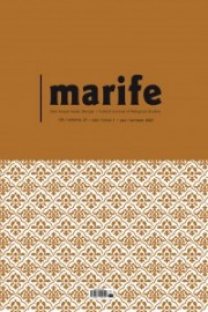Hanefî Mezhebinde Delil-Hüküm İlişkisi Bağlamında Tenzîhen-Tahrîmen Mekruh Ayrımı
Teklîfî hüküm kapsamında değerlendirilen mekruh kavramının çerçevesi ve diğer teklîfî hükümlerle bağlantısının incelenmesi, kavramın; gelişim sürecinde farklı anlamlara delâlet edecek şekilde kullanılması, özellikle haram kavramı ile yakın ilişkisi bulunması sebebiyle önem arz etmektedir. İlk dönem fıkıh eserlerinde haramı ya da haram oluşu şüpheli olan şeyleri aynı zamanda bir şeyin yapılmasının hoş görülmediğini ifade etmek üzere kullanılan mekruh kavramı, hüküm anlayışının sistemleşmesi ile birlikte teklîfî hükümler kapsamında değerlendirilerek cumhûr fukahânın benimsediği görüşe göre yapılmasında sevap terk edilmesinde ise günah olmayan hüküm şeklinde tanımlanmıştır. Hanefî mezhebinde ise bu genel görüşten farklı olarak mezhep içerisindeki farz-vacip ayrımı ile örtüşecek biçimde kavram, tenzîhen-tahrîmen mekruh şeklinde tasnîf edilmiştir. Bu nedenle mekruh kavramının Hanefî mezhebi sistematiği içerisinde incelenmesi gerekli görülmüştür. Her ne kadar bu ayrım belirgin olarak müteahhîrûn dönemi usûl ve furu‘ eserlerinde yer almakta ise de ayrımın,mezhebin erken döneminden itibaren var olduğu ve delil-hüküm ilişkisine bağlı olarak Hanefî mezhebinin şer‘î delil ve delillerin kesinliği yaklaşımı ile alâkalı olduğu tespit edilmiştir. Zira Hanefî mezhebinin teklîfî hükümleri tasnîfinde de hükmün dayanağı olan delilin sübût ve delâlet yönünden zannî ya da kat‘î oluşu dikkate alınmaktadır. Bununla beraber kat‘î-zannî delil çerçevesinde ele alınan tenzîhen-tahrîmen mekruh ayrımında kat‘î ve zannî olanın ayrıştırılması, verilen hükmün doğru anlaşılması açısından önemli bir husustur. Bu nedenle tenzîhen-tahrîmen mekruh ayrımı değerlendirilirken hükmün dayanağı olan delilin sübût ve delâlet yönünden ele alınması ve aynı zamanda fıkıh usûlü literatüründeki verilerle yetinilmeyip Hanefî fıkıh literatüründehükmün bağlantılı olduğu mesele ile ilgili açıklama ve gerekçelerin de göz önünde bulundurulması gerekmektedir.
Anahtar Kelimeler:
Hanefî mezhebi, Teklîfî hüküm, Kat‘î-zannî delil, Mekruh, Tenzîhen-tahrîmen mekruh
Within the Relation Evidence-Huqm the Distinction Between Makrooh Tahrîmen and Makrooh Tenzîhen in Hanafî Sect
The notion makrooh, considered as part of the provisions of responsibility, appears to be an important phenomenon because of its close relation to the notion haraam and its historical use in a way to refer to different meanings and connotations during the process of its evolution. The notion makrooh, used in the earlier scholarly works in an effort to make reference to the haraam and to imply that it is not proper to commit actions which may potentially fall into the category of haraam, was in later periods incorporated in the scope of provisions of responsibility in connection with the systematization of the notion huqm; subsequent to this process of incorporation, the notion makrooh was defined by the majority of the Islamic scholars as something whose commission does not render thawab and whose avoidance does not entail ithm. Unlike this general view, the Hanafi sect has classified the notion of makrooh as tenzîhen and tahrîmen in a way to become consistent with the distinction between farida and wajeeb. Therefore it’s regarded necessary to analyze the notion makrooh in Hanafî sect. Even though this distinction is evidently noticeable in the usul and furu’ works by the scholars of later period, the study finds that the distinction has been systemized in accordance with the general characteristics of the sect and depending on the relation between huqm and evidence, is related that is related to the Hanafi sect’s evidence approach. From this point of view, it could be said that in Hanafi sect, the makrooh tenzihi corresponds to mandoob whereas makrooh tahrimi to wajeeb or the sunnah considered as strong as wajeeb. However, in the tenzîhen-tahrîmen makrooh distinction made with reference to the Qat’i-Zanni evidence, detection of what constitutes the Zanni and the Qat’i is particularly important for the sake of proper inferences on the final provision. For this reason, in the assessment of the distinction between makrooh tahrîmen and makrooh tenzîhen, it is necessary to consider the evidence, support base for the final provision, it is also necessary to take account of the explanations and justifications in Hanafi fiqh literature regarding the issue that the judgment is related to.
Keywords:
Hanafi sect, Provision of responsibility, Qat’i-zanni evidence, Makrooh, Tahrimi-tenzihi makrooh,
- Yayın Aralığı: Yılda 2 Sayı
- Başlangıç: 31.05.2001
- Yayıncı: Yediveren Kitap
Sayıdaki Diğer Makaleler
Mu‘tezile’ye Göre Ahlâkın Temellendirilmesinde Vahyin ve Aklın Alanları
İftira Bir “Kötülük”tür ve “İnsanlık Suçu”dur!
Nurten Kiriş YILMAZ, Mevlüt ALBAYRAK
Akademik Tefsir Araştırmalarında Konu ve Kaynak Bulma Sorunlarına Çözüm Önerileri
Teşehhütte Şehâdet Parmağının Durumu
Tâbi‘ûn Döneminde Önemli Bir Müfessir: Mesrûk b. el-Ecda‘ (Biyografik Bir İnceleme)
Hanefî Mezhebinde Delil-Hüküm İlişkisi Bağlamında Tenzîhen-Tahrîmen Mekruh Ayrımı
İslam’da Bireyler Arası İletişim İlkeleri ve Günümüz Teorilerine Yansımaları
